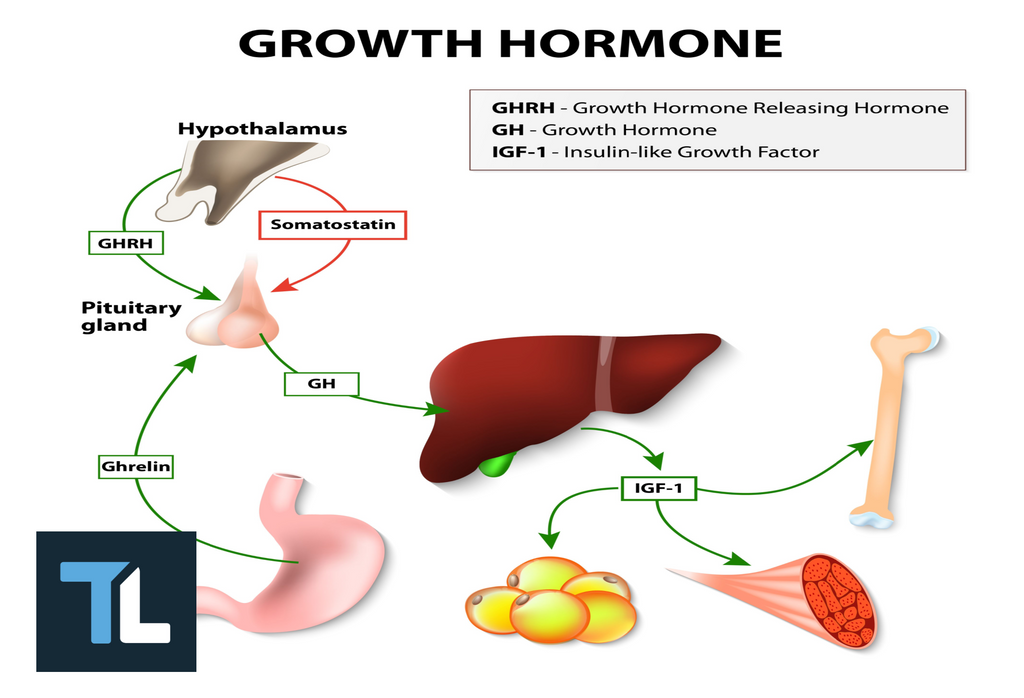Does Taking Human Growth Hormone Cause HGH Gut ("Bubble Gut")?

Does Taking Human Growth Hormone Really Cause HGH Gut ("Bubble Gut")?
Human growth hormone (HGH) is a peptide hormone comprised of 191 amino acids [1]. HGH is often revered as the "fountain of youth" since we produce significantly more growth hormone endogenously during the first 25 to 30 years of life than we do thereafter [2].
Yet, some people claim that growth hormone isn't an anabolic hormone, like testosterone and insulin. Others tout it as a muscle-building miracle that helps heal the body and cut body fat.
So, which is it? Does taking growth hormone really lead to more muscle growth and fat loss for active individuals? Does growth hormone use cause the eye-sore of a phenomenon affectionately known as the "HGH bubble gut"? Well, it depends...
What Does Human Growth Hormone Do?
Human growth hormone (HGH) is biosynthesized in the pituitary gland and secreted by specialized cells known as somatotrophs. Circulating growth hormone binds to growth hormone receptors distributed throughout body tissues to transduce anabolic, anti-catabolic, or catabolic signals [3]. The specific signaling cascade activated by growth hormone binding appears to depend largely on energy status, tissue specificity/site of action, and circulating growth factors.
In general, human growth hormone stimulates tissue growth and repair (directly or indirectly). For example, HGH facilitates the transport of several essential amino acids across the cell membrane, specifically neutral amino acids subject to sodium-independent transport, like L-leucine, L-isoleucine, and L-valine [4].
However, during times of energy and nutrient deprivation (e.g. when fasting), growth hormone promotes lipolysis (fat breakdown) and fatty acid oxidation, thereby sparing lean muscle tissue [5]. Hence, growth hormone is a "mobilizing" hormone that helps preserve muscle mass during a cutting/weight-loss phase.
Is Growth Hormone an Anabolic Hormone?
Human growth hormone does indeed have a variety of anabolic actions in the human body, but they are mechanistically different from those of, say, testosterone or insulin. For example, research has shown that HGH strongly inhibits amino acid oxidation and facilitates the transport of several essential amino acids from the gut into the systemic circulation [6, 7]. Thus, growth hormone preserves the circulating amino-acid pool and increases the intracellular availability of essential amino acids for incorporation into muscle proteins.
That being said, it appears that human growth hormone is a direct promoter of whole-body protein synthesis, but not necessarily protein synthesis in skeletal muscle cells. As such, excess growth hormone can cause vital organs like the liver and heart to hypertrophy, leading to health complications down the road.

Longer-term increases in muscle protein synthesis mediated by growth hormone are the result of downstream paracrine (read: local) IGF-1 release. It might seem intuitive, then, to take IGF-1 itself rather than growth hormone since the former is the superior anabolic (or "building") hormone, but IGF-1 use s also complicated by nonspecific tissue growth [8].
So, it's reasonable to assume that "HGH gut" is a ramification of using growth hormone itself and/or IGF-1 for performance enhancement.
What Causes HGH "Bubble Gut"?
While HGH abuse might not be entirely responsible for the loathsome "bubble gut" phenomenon in bodybuilding subculture, it undoubtedly is a contributing factor. The risk of developing HGH gut becomes even more likely when you add a calorie-rich, muscle-building diet and large doses of performance-enhancing drugs like anabolic steroids and insulin to the mix.
Insulin and IGF-1 are likely the central culprits of HGH gut from a physiological standpoint, as these are potent storage hormones that can increase organ size, including the intestines, and visceral fat accumulation behind the abdominal wall. When subcutaneous body fat levels are low enough, the result looks like a well-defined, protruding midsection.
Practical Ways to Increase Growth Hormone Production
Human growth hormone is a highly complex peptide hormone, and many of its putative biological roles remain to be fully elucidated [9]. What we can say with confidence is that growth hormone promotes whole-body protein synthesis, reduces whole-body protein breakdown, and liberates fatty acids for use as energy. Given that growth hormone stimulates the production of paracrine IGF-1, it is an important muscle-building catalyst.
So, how do you boost growth hormone levels without taking exogenous growth hormone?
As noted above, numerous factors determine when the body produces growth hormone. Given that GH is secreted in a pulsatile fashion, with about 70% of the total daily output occurring during deep sleep, the best thing anyone can do to increase GH naturally is get plenty of quality sleep.
It's also worthwhile to consider the following evidence-based list of activities, lifestyle habits, and factors that can increase growth hormone production throughout the day [10, 11, 12, 13, 14, 15]:
High-intensity exercise, especially resistance training
L-DOPA (levodopa), the biological precursor to the neurotransmitter dopamine
Nicotinic acid (Vitamin B3), not to be confused with the niacinamide form
Various nicotinic acetylcholine receptor (nAChR) agonists, including nicotine
Note: The health risks of ingesting nicotine/smoking tobacco chronically greatly outweigh the benefits.
Somatostatin inhibitors
Peptide hormones such as ghrelin and growth hormone-releasing hormone (GHRH)
Contrarily, several intrinsic and extrinsic factors can reduce growth hormone signaling by either blunting growth hormone production in the pituitary or blocking growth hormone receptors on somatic cells, including [16]:
-
Upregulated somatostatin
-
Hyperglycemia (i.e. excess glucose in the bloodstream)
-
Exogenous IGF-1 and GH (due to negative feedback inhibition on the pituitary gland)
-
Xenobiotics like phthalate plasticizers and other environmental contaminants
-
Glucocorticoids (e.g. cortisol)
-
Certain sex hormone metabolites, such as dihydrotestosterone (DHT)
Over time, these factors can cause growth hormone deficiency, making it tougher to build muscle mass and shed body fat (especially visceral fat).
Taking Growth Hormone: A Fountain of Youth or Wishful Thinking?
As time evolves, more middle-aged adults are taking a keen interest in "HGH replacement therapy" for its purported longevity benefits. Many so-called "anti-aging" clinics are cropping up all over the United States, with physicians ready to prescribe human growth hormone and other "vitalizing" hormones, notably testosterone.
Granted, the doses of growth hormone that high-level bodybuilders take are far beyond what you would ever use for anti-aging or hormone replacement therapy (HRT). Some of these individuals take upwards of 20 IUs of growth hormone every day, a dose equivalent to more than four times what the average young adult produces endogenously during peak deep-sleep stages [17].
Modest doses of exogenous growth hormone (e.g. 2-3 IU per day), on the other hand, are unlikely to cause the patent "HGH gut" that has plagued physique competitions since the early 21st century.































